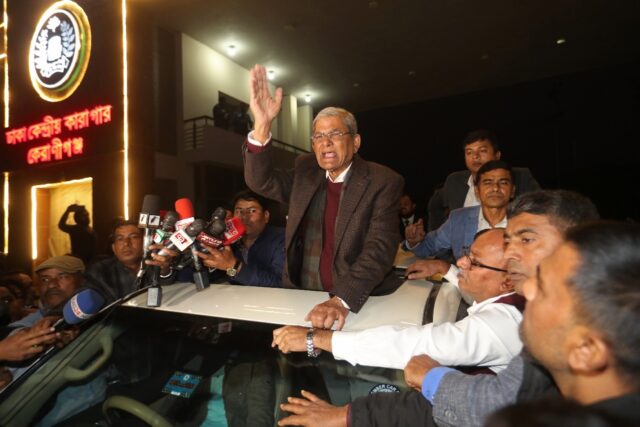Bangladesh’s main opposition leader and more than 100 other top party members were charged on Sunday with the murder of a policeman killed in mass demonstrations ahead of upcoming elections.
Those charged make up the bulk of the opposition leadership — potentially facing the death penalty if found guilty — and could threaten to derail general elections due within three months.
“At least 164 Bangladesh Nationalist Party (BNP) including Mirza Fakhrul Islam Alamgir were accused of murdering the police officer,” police official Salahuddin Mia said, adding that charges had been filed against them.
Alamgir, 75, the BNP’s secretary-general, has led the party since BNP chairwoman and two-time former premier Khaleda Zia was arrested and jailed, and her son went into exile in Britain.
The resurgent opposition has been mounting protests against Prime Minister Sheikh Hasina for months, despite ailing leader Zia being effectively under house arrest since her release from prison after a conviction on corruption charges.
Saturday’s protests by BNP and the largest Islamist party, Jamaat-e-Islami, were among the biggest this year, with more than 100,000 supporters of the two major opposition parties demanding Hasina step down to allow a free and fair vote under a neutral government.
Dhaka police commissioner Habibur Rahman had earlier said Alamgir had been “detained for interrogation” for Saturday’s violence in which a police officer and a protester were killed.
Police on Saturday said the officer had been hacked to death and accused BNP activists of the killing.
Protesters and police clashed again on Sunday in multiple locations.
Violence has sparked international concern, with the United States on Saturday calling for “calm and restraint on all sides”.
The European Union on Sunday said it was “vital that a peaceful way forward for participatory and peaceful elections is found” in Bangladesh, the world’s eighth most populous country with a population of around 170 million.
Hasina — the daughter of the country’s founding leader — has been in power for 15 years and has overseen rapid economic growth in the Muslim-majority nation.
Bangladesh has overtaken neighbouring India in GDP per capita, but its inflation has risen and Hasina’s government is accused of corruption and human rights abuses.
BNP party spokesman Zahir Uddin Swapan said that nearly 3,000 party activists and supporters had been detained in the past week, while Dhaka Metropolitan Police said at least 1,480 opposition activists had been arrested and charged with violence since October 21.
They include nearly 700 people arrested during Saturday’s protests.
Security on Sunday was tight in the capital with thousands of members of security forces patrolling the streets.
But police in the northern district of Lalmonirhat said a youth leader in the ruling party was killed and several others injured during violent clashes between hundreds of opposition and ruling party supporters.
Opposition activists and police clashed in several rural districts as well as the industrial city of Narayanganj, police said.
Officers fired rubber bullets and tear gas at the protesters after they burned tyres on a road and tried to vandalise vehicles, district police chief Golan Mostofa Russell told AFP.
One officer was injured, police said, while local media reported two BNP protesters were also injured.
Hasina’s ruling Awami League dominates the legislature in Bangladesh and runs it virtually as a rubber stamp.
Her security forces are accused of detaining tens of thousands of opposition activists, killing hundreds in extrajudicial encounters and disappearing hundreds of leaders and supporters.

COMMENTS
Please let us know if you're having issues with commenting.